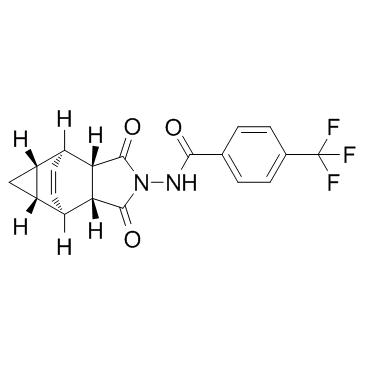Tecovirimat
Modify Date: 2024-01-10 02:18:39

Tecovirimat structure
|
Common Name | Tecovirimat | ||
|---|---|---|---|---|
| CAS Number | 869572-92-9 | Molecular Weight | 376.32900 | |
| Density | N/A | Boiling Point | N/A | |
| Molecular Formula | C19H15F3N2O3 | Melting Point | N/A | |
| MSDS | N/A | Flash Point | N/A | |
Use of TecovirimatTecovirimat(ST-246) is an orally bioavailable antipoxvirus compound; potent and selective active against multiple orthopoxviruses with EC50 about 10 nM.IC50 value: 10 nM [1]Target: antipoxvirusin vitro: ST-246 targets the cowpox virus V061 gene, which encodes a major envelope protein homologous to the vaccinia virus F13L gene product. The antiviral potency and selectivity of ST-246 was measured in CPE assays against a panel of DNA- and RNA-containing viruses. In these assays, the EC50 for inhibition of vaccinia virus was determined to be 0.01 μM, while the EC50 values for inhibition of unrelated viruses were >40 μM [1]. ST-246 was evaluated for activity against cowpox virus (CV), vaccinia virus (VV), and ectromelia virus (ECTV) and had an in vitro 50% effective concentration (EC50) of 0.48 microM against CV, 0.05 microM against VV, and 0.07 microM against ECTV. The selectivity indices were >208 and >2,000 for CV and VV, respectively. The in vitro antiviral activity of ST-246 was significantly greater than that of cidofovir, which had an EC50 of 41.1 microM against CV and 29.2 microM against VV, with selectivity indices of >7 and >10, respectively [2]. in vivo: Mice were treated with placebo (vehicle), ST-246 administered by oral gavage at 50 mg/kg twice a day (b.i.d.) for 14 days, or CDV administered as a single intraperitoneal (i.p.) injection at 100 mg/kg. ST-246-treated mice mounted a protective immune response to vaccinia virus infection [1]. ST-246 administered once daily by oral gavage to mice infected intranasally with CV beginning 4 h or delayed until 72 h postinoculation was highly effective when given for a 14-day duration using 100, 30, or 10 mg/kg of body weight. When 100 mg/kg of ST-246 was administered to VV-infected mice, a duration of 5 days was sufficient to significantly reduce mortality even when treatment was delayed 24 h postinoculation. Viral replication in liver, spleen, and kidney, but not lung, of CV- or VV-infected mice was reduced by ST-246 compared to levels for vehicle-treated mice [2]. |
| Name | N-(1,3-dioxo-3,3a,4,4a,5,5a,6,6a-octahydro-4,6-ethenocyclopropa[f]isoindol-2(1H)-yl)-4-(trifluoromethyl)benzamide |
|---|---|
| Synonym | More Synonyms |
| Description | Tecovirimat(ST-246) is an orally bioavailable antipoxvirus compound; potent and selective active against multiple orthopoxviruses with EC50 about 10 nM.IC50 value: 10 nM [1]Target: antipoxvirusin vitro: ST-246 targets the cowpox virus V061 gene, which encodes a major envelope protein homologous to the vaccinia virus F13L gene product. The antiviral potency and selectivity of ST-246 was measured in CPE assays against a panel of DNA- and RNA-containing viruses. In these assays, the EC50 for inhibition of vaccinia virus was determined to be 0.01 μM, while the EC50 values for inhibition of unrelated viruses were >40 μM [1]. ST-246 was evaluated for activity against cowpox virus (CV), vaccinia virus (VV), and ectromelia virus (ECTV) and had an in vitro 50% effective concentration (EC50) of 0.48 microM against CV, 0.05 microM against VV, and 0.07 microM against ECTV. The selectivity indices were >208 and >2,000 for CV and VV, respectively. The in vitro antiviral activity of ST-246 was significantly greater than that of cidofovir, which had an EC50 of 41.1 microM against CV and 29.2 microM against VV, with selectivity indices of >7 and >10, respectively [2]. in vivo: Mice were treated with placebo (vehicle), ST-246 administered by oral gavage at 50 mg/kg twice a day (b.i.d.) for 14 days, or CDV administered as a single intraperitoneal (i.p.) injection at 100 mg/kg. ST-246-treated mice mounted a protective immune response to vaccinia virus infection [1]. ST-246 administered once daily by oral gavage to mice infected intranasally with CV beginning 4 h or delayed until 72 h postinoculation was highly effective when given for a 14-day duration using 100, 30, or 10 mg/kg of body weight. When 100 mg/kg of ST-246 was administered to VV-infected mice, a duration of 5 days was sufficient to significantly reduce mortality even when treatment was delayed 24 h postinoculation. Viral replication in liver, spleen, and kidney, but not lung, of CV- or VV-infected mice was reduced by ST-246 compared to levels for vehicle-treated mice [2]. |
|---|---|
| Related Catalog | |
| References |
| Molecular Formula | C19H15F3N2O3 |
|---|---|
| Molecular Weight | 376.32900 |
| Exact Mass | 376.10300 |
| PSA | 66.48000 |
| LogP | 2.73210 |
| Tecovirimat |